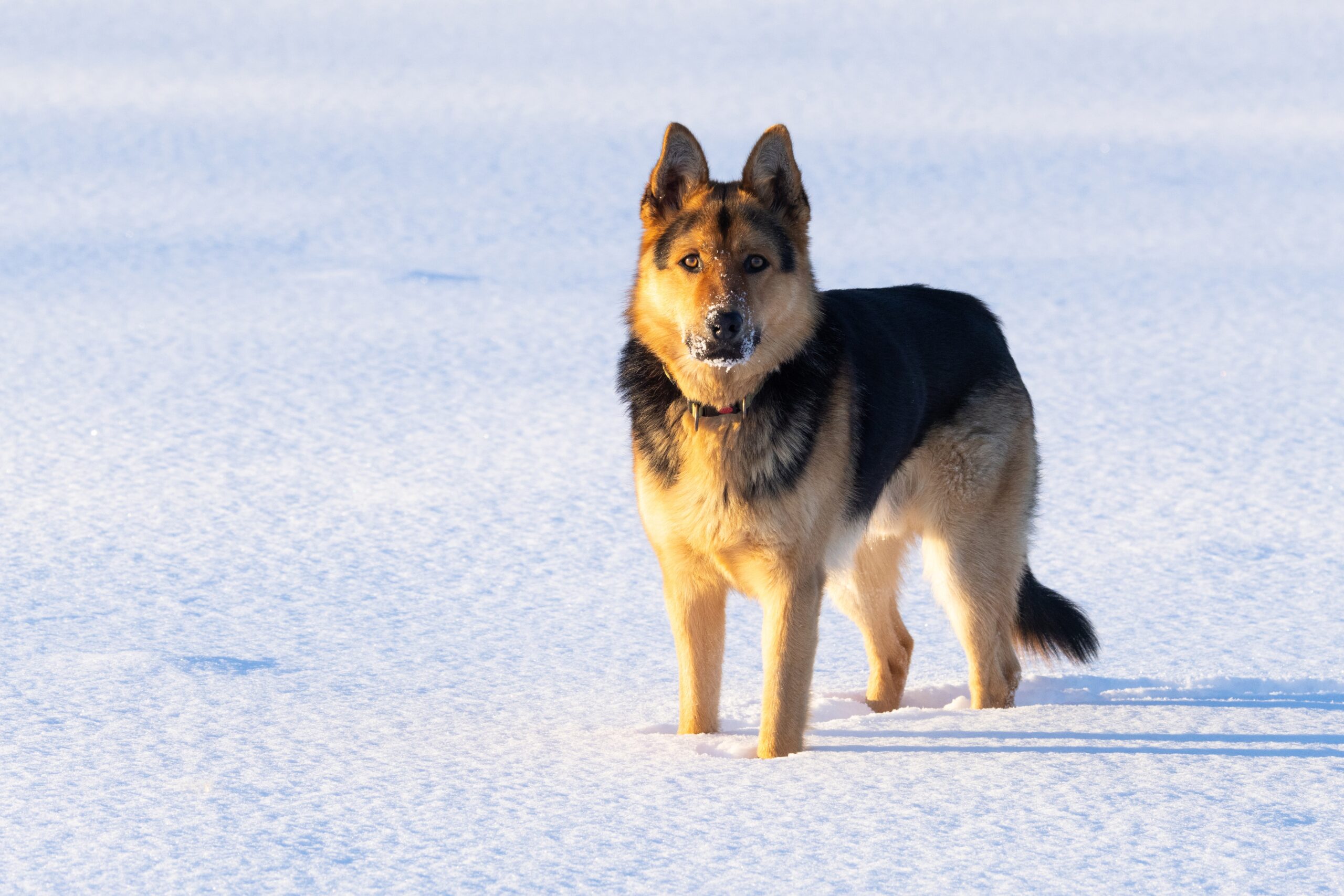14 Types of Dog Breeds Prone to Sensitive Stomachs (With Pictures)
Updated on

It’s no secret that certain dog breeds are predisposed to certain ailments and genetic health conditions, but some are even prone to have more sensitive stomachs than others. “Sensitive stomach” is more of a blanket term that represents different digestive issues.
It’s important to note that most conditions related to sensitive stomachs are more of an individual occurrence that can be more likely in certain breeds, so we will go over which dog breeds are more likely to suffer from a sensitive stomach.
The 14 Dog Breeds Prone to Sensitive Stomachs
1. Irish Setter

- Gluten-Sensitive Enteropathy
- Food Sensitivities
- Inflammatory Bowel Disease
- Gastric Dilation Volvulus
The Irish Setter is a gorgeous breed that falls into the sporting group, having been bred as gundogs. They are predisposed to several digestive issues including gluten-sensitive enteropathy, and bloat, which can lead to gastric dilation volvulus, food sensitivities, and inflammatory bowel disease.
A lot of Irish Setters are placed on grain-free diets because of their gluten sensitivity. While inflammatory bowel disease is a relatively rare condition in dogs, it seems to be caused by chronic irritation of the digestive tract which occurs with gluten and other food sensitivities.
2. Great Dane
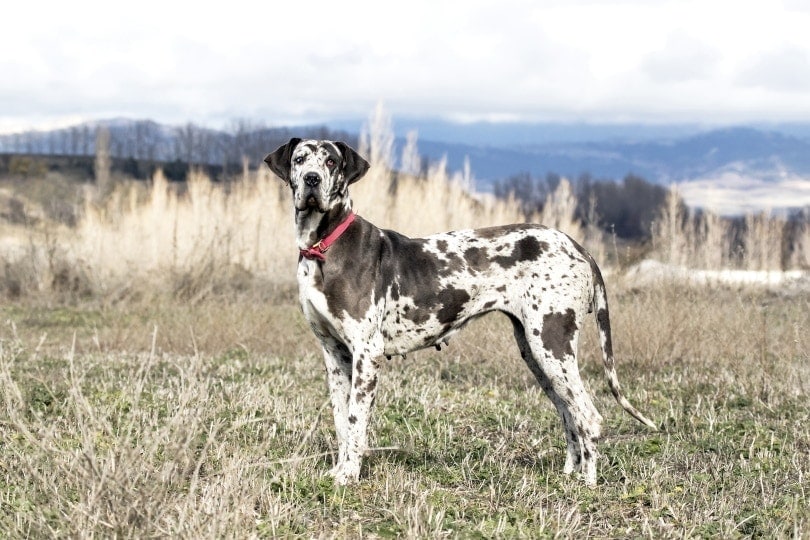
- Gastric Dilation Volvulus
The Great Dane is one of the largest dog breeds and they also have deep chests, which puts them at a very high risk of developing bloat, also known as gastric dilation volvulus, or GDV. GDV occurs when the stomach twists after it has filled it with either gas, food, or fluid.
This is a potentially fatal and very painful condition. It is considered a medical emergency and the prognosis is dependent on how quickly treatment is administered. Prophylactic gastropexy is a surgery performed in high-risk younger dogs like Great Danes to prevent bloat from occurring.
3. Labrador Retriever

- Food Allergies
The Labrador Retriever is a very popular family dog and hunting companion, but they do suffer from a higher occurrence of food allergies than some other breeds. The most common food allergies are from protein sources like beef, chicken, chicken eggs, and dairy but in some cases, they could be caused by wheat, corn, or soy.
Labrador Retrievers are also prone to environmental allergies in addition to food allergies, so it’s best to get to the root cause by consulting with a veterinarian. Once the allergens have been identified, owners can take steps to alter the diet appropriately and implement treatment options as needed.
4. West Highland Terrier

- Food Allergies
The alert and active West Highland Terrier have a reputation for being independent and loving the chase. These small terriers are prone to all sorts of allergies, and food allergies are no exception. Once a Westie starts showing symptoms of allergies, it’s time to examine their diet.
As with most allergies and sensitivities related to foods, you must consider chicken, beef, chicken eggs, dairy, wheat, corn, and soy. Figuring out the exact allergens is typically trial and error through elimination diets and a lot of West Highland Terriers are placed on special diets because of their sensitive stomachs.
5. German Shepherd
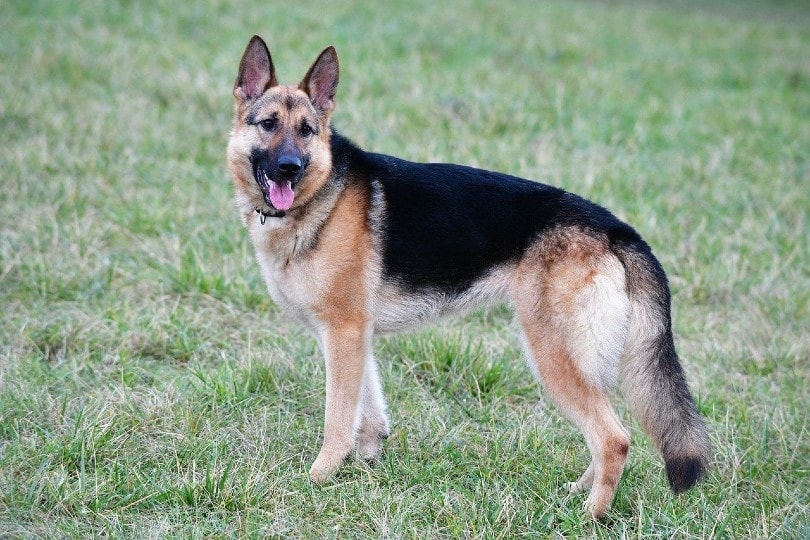
- Food Allergies
- Gastric Dilation Volvulus (Bloat)
- Eosinophilic Gastroenteritis
The beautiful, intelligent, and courageous German Shepherd is as loyal as they come. The breed is predisposed to some unfortunate stomach sensitivities, including food allergies, GDV, and Eosinophilic gastroenteritis.
Eosinophilic gastroenteritis is a rarer condition that is most often seen in dogs less than 5 years of age. It does affect certain breeds more commonly than others. It is a type of inflammatory condition that affects the stomach and intestines because the digestive tract is infiltrated with eosinophils, a type of white blood.
Of course, food and other allergies are often seen in German Shepherds so owners need to be on the lookout for telltale symptoms1. They are also a large, deep-chested breed that can be prone to GDV.
6. Golden Retriever
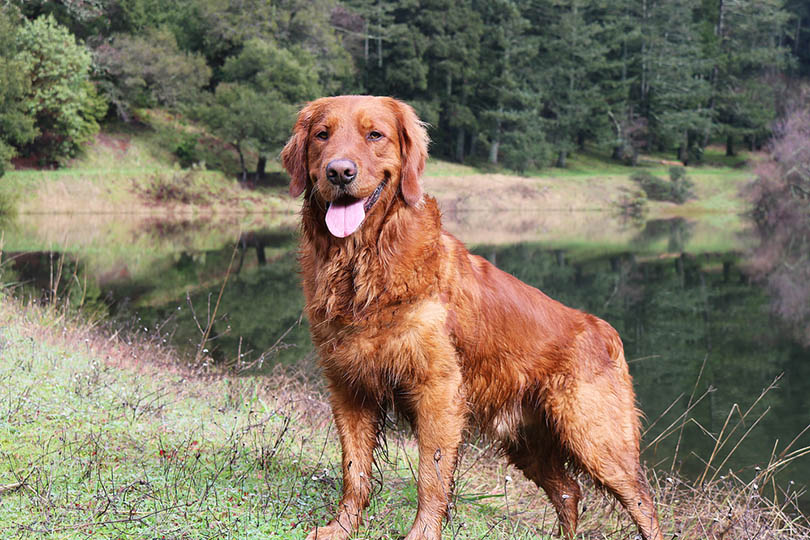
- Food Allergies
- Gastric Dilation Volvulus
The beloved Golden Retriever is another breed that is prone to food allergies or sensitivities. Food allergies aren’t where it ends though, the breed is also susceptible to environmental allergies so owners should be aware of what symptoms to watch for so they can identify allergies and work to treat them through diet or other means.
Golden Retrievers are also deep-chested and while they may not have the size of a Great Dane, they can still be susceptible to bloat, so it’s important to implement preventative measures.
7. Boxer

- Food Allergies
- Gastric Dilation Volvulus
Boxers are predisposed to some genetic health conditions and tend to suffer from food-related allergies. Not all Boxers will have this trouble but it’s certainly not uncommon among the breeds. They are also larger and deep-chested, so GDV is another condition they are susceptible to.
8. Pit Bull Terrier
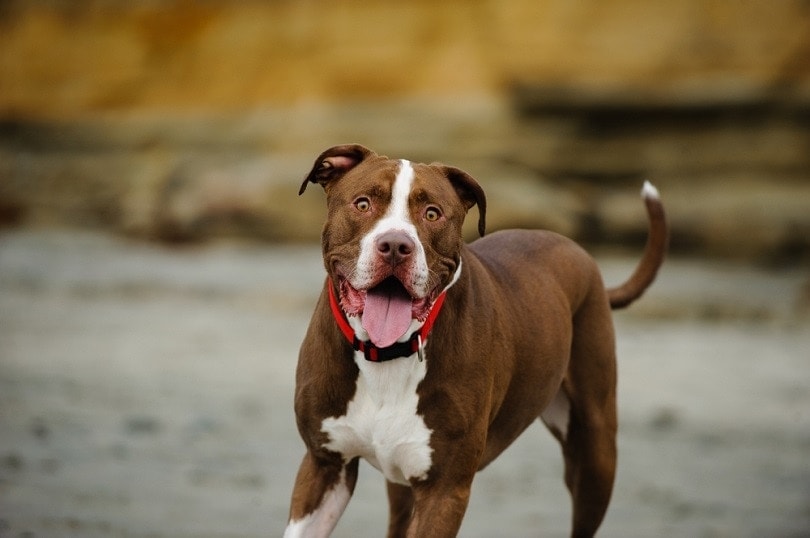
- Food Allergies
The Pit Bull Terrier is known to suffer from food allergies, which are typically related to a specific protein source. If a Pit Bull is suffering from skin or digestive issues, it’s time to examine the ingredients in their dog food. It’s a good idea to stay away from chicken and beef protein sources if you notice symptoms of food allergies, as they are the most common protein allergens. Once the allergen is identified, you can work with your veterinarian and alter their diet to better suit their needs.
9. Bichon Frise

- Food Allergies
The precious Bichon Frise is a very popular companion dog that is well suited for allergy sufferers since they produce much fewer allergens than other breeds. While they produce fewer allergens than humans, they tend to suffer from their own issues with allergies.
The Bichon Frise commonly suffers from food-related allergies. These issues typically show themselves by way of skin issues but changes in bowel habits can also be an indicator.
10. French Bulldog

- Food Allergies
French Bulldogs are no strangers to genetic health conditions2 and food allergies are one of the many issues the breed faces. Their food allergies tend to manifest as skin conditions, so it’s best to keep an eye out for excessive scratching, dermatitis, or any other unusual symptoms. Generally, the allergen source is animal protein-related and could be the result of beef, chicken, chicken eggs, or even dairy.
11. Maltese

- Food Allergies
The Maltese, which is genetically related to the Bichon Frise, also often suffers from food-related allergies. Animal proteins like beef and chicken are usually to blame but Maltese could also suffer from allergies related to chicken eggs, soy, wheat, corn, or dairy products.
12. Shar Pei

- Eosinophilic Gastroenteritis
- Food Allergies
- Inflammatory Bowel Disease
The Shar-Pei tends to have a higher incidence of food allergies than other breeds. As with most dogs, it is usually the animal protein in the food that causes the allergy, but it could also be the result of additives like corn, soy, or wheat. A lot of Shar Pei’s are placed on grain-free diets but it’s always best to check with their veterinarian before making any changes to the diet.
13. Cocker Spaniel

- Food Allergies
Cocker Spaniels tend to be prone3 to food and environmental allergies. These allergies can occur at any age but seem to occur more during their youth. The symptoms tend to manifest in the skin and cause recurring ear infections and itchiness. They may also have instances of diarrhea and/or vomiting. If any symptoms of allergies show up, it’s time for a vet visit.
14. Basset Hound

- Food Allergies
- Gastric Dilation Volvulus (Bloat)
Another breed prone to allergies is the Basset Hound. A lot of breeders seem to believe that these allergies are most commonly a result of chicken, wheat, corn, or soy. This unique breed may be small, but they are also at risk of developing gastric dilation volvulus due to their deep chest.
Sensitive Stomachs Explained
A healthy, well-functioning digestive system is important for a dog’s overall health. A sensitive stomach can be due to several underlying factors and as we’ve mentioned, is more of a blanket term that encompasses many different issues. It ranges from inherited digestive disorders, food allergies, or even just digestive disturbances that take place with dietary changes.
A sensitive stomach can occur in any dog, regardless of breed and though some breeds may be more likely to develop certain conditions, it is more of an individual occurrence.
What Causes a Sensitive Stomach?
Finding the root cause of stomach sensitivity is important so the proper measure can be put in place for treatment. Here’s a list of the most common causes, though there are many other digestive issues not included on this list.
Sudden Dietary Changes
Have you ever done a sudden dog food swap and noticed your dog ended up with loose, watery stools? That’s because a sudden change in diet and ingredients can cause a bout of digestive upset. It can take a little while to resolve, too. It’s always best to check with your veterinarian before changing your dog’s diet and doing so slowly, through a transition with their old food.
Overindulging
Some dogs may get sick from eating too much, too quickly. This happens with people too, so I’m sure you can relate. Overeating can lead to nausea, vomiting, and even a temporary change in bowel habits for some.
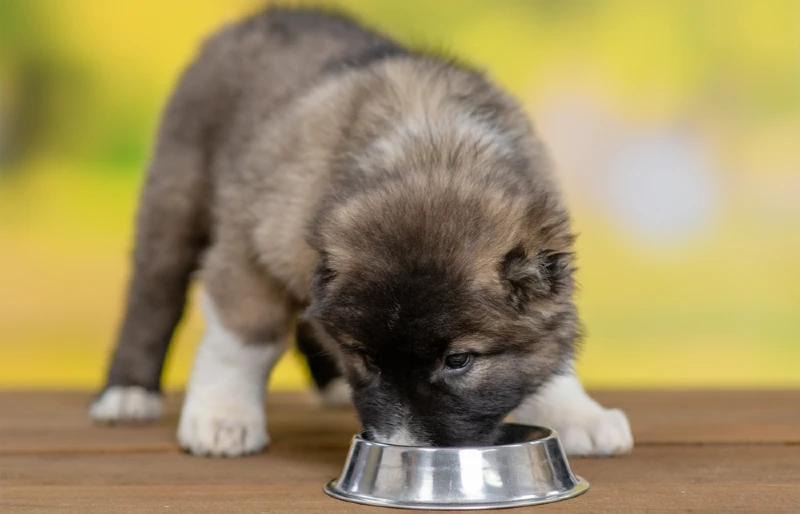
Foreign Body Ingestion
It’s a dreaded thought, but when a dog ingests something, it shouldn’t have, it can wreak havoc on its system. While sometimes these objects can be passed through the system without issue, foreign body ingestion can lead to partial or full obstruction of the digestive system, which is a potentially fatal condition. If your dog has eaten something it shouldn’t have or you notice any unusual symptoms, reach out to your vet as soon as possible.
Gastrointestinal Worms
Four common types of intestinal worms infect dogs including roundworms, hookworms, whipworms, and tapeworms. The symptoms of each type of worm may vary but if you notice any unusual stools, worm segments in the stool, butt scooting, swelling of the abdomen, or bloody, mucous stools, worms may be the culprit.
Motion Sickness
Has your pup ever suddenly thrown up while you are driving down the road? That’s because they can be susceptible to motion sickness just like we are. If you travel a lot and this is a chronic issue, it’s best to reach out to your veterinarian for potential solutions.
Food Allergies or Sensitivities
Food allergies and sensitivities are common problems among dogs and lead to a variety of symptoms. Allergies can be the result of certain animal proteins or even some grains. Some dogs may even suffer from gluten-sensitive enteropathy.
While allergies and sensitivities are different, the symptoms tend to be the same. They can be more common in certain breeds, as you can see above. Symptoms can manifest through the digestive system and cause diarrhea and/or vomiting, but they can also cause skin symptoms like itchiness, dermatitis, recurring ear infections, and more. In this case, the diet will need to be changed, so seeing a vet for further guidance is necessary.
GDV (Bloat)
Bloat, which is also known as gastric dilatation-volvulus, or GDV is considered a medical and surgical emergency. In the first stage of the condition, the stomach fills with gas, fluid, or food and begins to dilate, or bloat. If the bloat becomes large enough it can turn into a volvulus, which occurs when the stomach twists and blocks blood supply. This condition is common in larger breeds and those with deep chests. It’s important to know the risk factors of bloat so that you can do your part in reducing the risk.

Conclusion
A sensitive stomach isn’t always the result of an inherited disorder and many different factors can cause stomach sensitivity. While the breeds listed above tend to have a higher incidence of sensitive stomachs, it can happen with any dog at any age. The best thing you can do is feed your dog a high-quality diet that is appropriate to its age, size, activity level, and health condition. Don’t make any changes to their meal plan without first speaking to your veterinarian and always reach out to them if you notice any unusual symptoms.
See also:
- 10 Best Dog Treats for Sensitive Stomachs – Reviews & Top Picks
- 10 Best Grain-Free Puppy Foods – Reviews & Top Picks
Featured Image Credit: Kseniia Kolesnikova, Shutterstock




